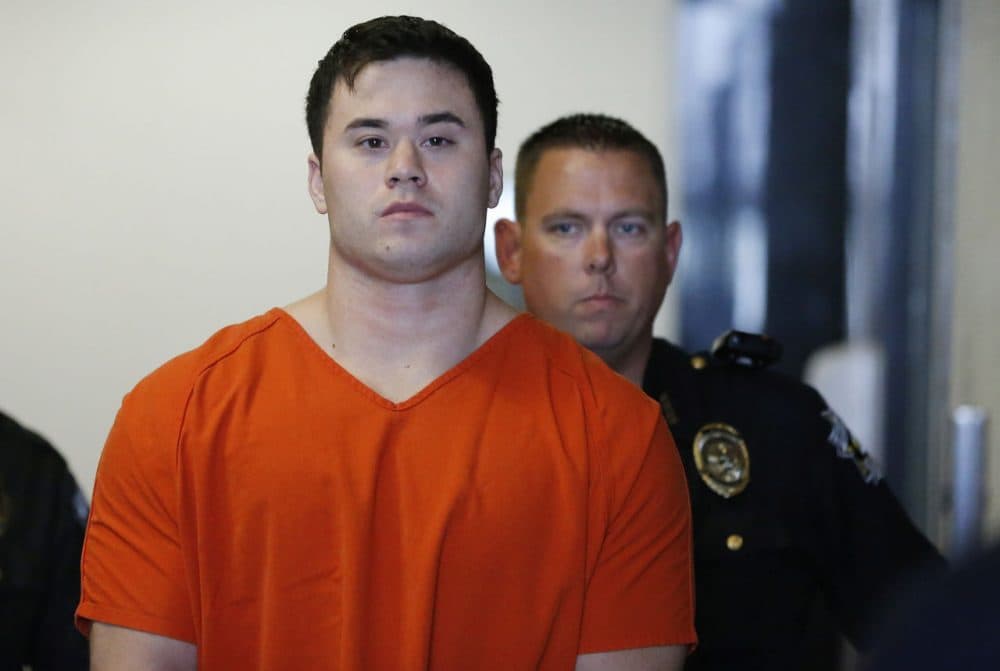Advertisement
Documenting Sex Crimes, Sexual Misconduct By Police
Resume
A jury in Oklahoma City yesterday found former police officer Daniel Holtzclaw guilty of rape and sexual assault in a case involving eight women. According to a new Associated Press investigation called "Betrayed by the Badge," this case is not an isolated incident.
The yearlong investigation by AP found about 1,000 police officers who lost their licenses over for sexual misconduct and crimes, ranging from rape to propositioning citizens. Sarasota Police Chief Bernadette DiPino in Florida told the Associated Press, "It's happening probably in every law enforcement agency across the country."
Nomaan Merchant was one of the reporters on the investigation. He discusses it with Here & Now's Eric Westervelt.
Interview Highlights
What sparked the investigation?
“Daniel Holtzclaw’s case is what inspired our investigation into police sexual misconduct. He was arrested last year after a grandmother in her 50s came forward and said that an officer had pulled her over and forced her to perform oral sex. Police began investigating the officer who she accused and found eventually a dozen of other women who came forward and said that they had been victimized by Daniel Holtzclaw, either in searches or traffic stops. That case led us to ask what seemed to be a simple question, which is ‘how often does this type of case occur?' What we found is that there’s no easy answer. There are really no good federal statistics on police sexual misconduct or police misconduct at large. So we had to go state by state to collect the best records we could, and found that over a six year period, there had been 1,000 officers that the states had pushed off the force for sexual assault, for rape, for sexual battery, as well as for other types of sexual misconduct.”
Do you think the actual number is larger due to unreported cases?
“Absolutely. There were several states that didn’t give us any data, including California and New York. We relied on records from a process known as police decertification. In 44 states, police officers are licensed by the state, and in those states they can be removed from law enforcement, they can be decertified from their licenses for various forms of police misconduct. We received records from 41 states, but those states don’t include California, New York, New Jersey. And of the states that did respond to us, many of them didn’t provide a lot of records because decertification practices vary greatly from state to state.”
How did police chiefs respond to this report?
“Police chiefs acknowledge that sexual misconduct has been a problem for a long time, and an International Association of Chiefs of Police report from 2011 found that there were potential parts of police culture that could be conducive to a sexual predator. Police officers work without a lot of supervision in the field, they work with marginalized populations, often late at night, and these are the types of things that without really strong monitoring could lead to the type of case we saw with Daniel Holtzclaw in Oklahoma City.”
How did Holtzclaw get away with this for so long?
“Police say that Holtzclaw was able to prey on women in a minority, low-income neighborhood in northeast Oklahoma City. He specifically targeted women with drug addictions, and one case involving a woman who was a prostitute on the street who he picked up and drove home and then raped her in her house. He was able to target marginalized women who believed they wouldn’t be believed if they went to the police. One woman testified when asked why she didn’t call the police herself at first, she said ‘who are you going to call on the police?’”
Is this going to be solved at the state and local level, or is there a federal role?
“There’s room for action at all levels. But really it boils down to a state level and really local level in terms of enforcement, in terms of monitoring officers they hire and that are put into the field for the first time. Holtzclaw was a three-year veteran of the police force when he was arrested and eventually fired for this case, and ultimately in interviewing his police chief, the chief said this was the worst case he’s seen in four decades of law enforcement but he also said there’s a certain amount of uncertainty. When you hire an officer, especially in this early- to mid-20s, there’s only so much training you can give them before you put them out in the field and they have to respond to circumstances in the field. There’s a lot of things that need to be done at the local, state and federal levels to make sure that the vast majority of police officers who would never do anything like this aren’t tainted by the small minority that go out and commit crimes such as the one that Holtzclaw was convicted of.”
Guest
- Nomaan Merchant, reporter for the Associated Press based in Dallas, Texas. He tweets @NomaanMerchant.
Host
- Eric Westervelt, correspondent for NPR and guest host for Here & Now. He tweets @Ericnpr.
This segment aired on December 11, 2015.